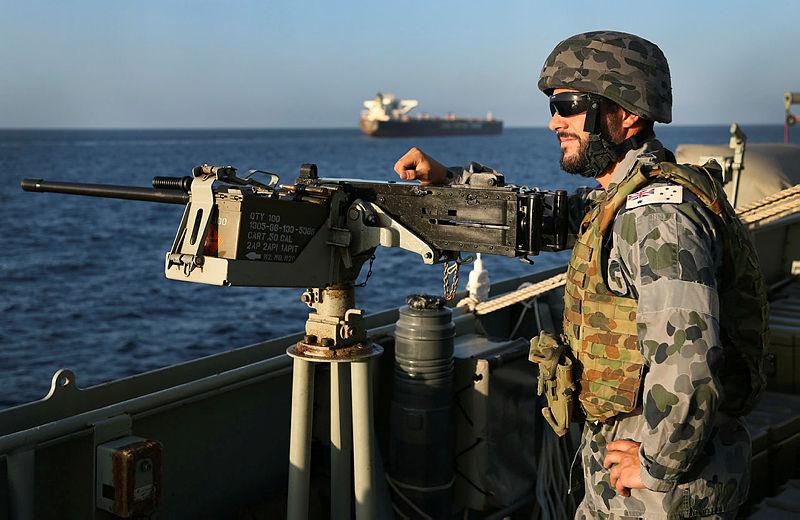Back to the Middle East, but at what cost?
Posted By Malcolm Davis on August 22, 2019 @ 06:00

They say timing is everything. This week I’ve been devouring the United States Studies Centre’s excellent new report [1], Averting crisis: American strategy, military spending and collective defence in the Indo-Pacific. It makes a convincing argument that in the face of an overwhelming threat posed by a rising and assertive China, the US is ill-prepared to meet the prospect of prolonged strategic competition in the Indo-Pacific.
Part of the reason for this ‘crisis of strategic insolvency’ is operational and resource overstretch. Two decades of counterinsurgency and counterterrorism operations in the Middle East, combined with insufficient defence funding, has led to an ageing and atrophying US military. Now, with tensions running high between the US and Iran, there’s a risk that, rather than getting out of its Middle East commitments and focusing on capability development and operational readiness for a possible conflict with China in the Indo-Pacific, the US could be sucked into another Middle East quagmire [2] that could be far more costly and lengthy than either Iraq or Afghanistan.
As a key US ally, Australia faces tough choices in prioritising its capability development and operational deployment decisions. So, the announcement [3] by the Morrison government that Australia will send military assets and personnel to the Persian Gulf region to ensure freedom of navigation and protect vital shipping lanes, alongside the US and other allies, is important to consider in the broader context of our need to shift our operational priorities to focus on the Indo-Pacific.
The new deployment is not huge in scale or scope. Australia’s contribution will occur under Operation Manitou [4], which is the current name for the Australian government’s longstanding support for maritime security [5], stability and prosperity in the Middle East. The program has been going on, in one form or another, since before the 1991 Gulf War.
This new Australian deployment will be limited in scale and duration. It will consist of a single RAAF P-8 Poseidon maritime surveillance aircraft with a crew of 10 for a month before the end of this year; a RAN frigate with 177 crew for six months in early 2020; and a contingent of ADF personnel to be based in Bahrain to help coordinate with allies.
The government’s stated rationale for this decision is two-fold: safeguarding oil and gas supplies and preserving the rules-based international order. The concern is that any disruption to commercial shipping through the Strait of Hormuz by Iran, or its partners, could imperil Australia’s access to critical energy resources. In making the announcement, the prime minister noted [6] that, ‘Fifteen to 16 per cent of crude oil and 25 to 30 per cent of refined oil destined for Australia transits through the Strait of Hormuz. So it’s a potential threat to our economy.’
Had the Morrison government, or, for that matter, previous governments, taken energy security seriously [7], the risks to Australia would not have been so great. The reality is that we’re woefully underprepared for a disruption to fuel supplies. Successive governments, both Coalition and Labor, have consistently ignored their international obligations to have at least a 90-day supply of fuel—we currently have just 28 [8] days.
Now, with the risk of an interruption to commercial shipping and thus potentially to our energy supplies, the government has to act. Ensuring the uninterrupted flow of vital energy and fuel resources through the Strait of Hormuz demands Australia step up to that task rather than rely on others to carry the burden.
Related to the issue of energy security is the importance of maintaining our alliance with the US. With the prime minister heading off to Washington next month for meetings with President Donald Trump and other key figures in his administration, the strength of the alliance is uppermost in the minds of policy thinkers.
There are many ways we can achieve that goal. Following the recent AUSMIN dialogue, the government saw fit to silence [9] any discussion of basing US medium-range missiles in northern Australia. This was in spite of the obvious benefits that Australia’s vast north offers for basing mobile launchers compared with Guam or Okinawa. Although the 4,000-kilometre-range ballistic missile currently under development by the US can’t reach China from Australia, a recent report [10] from the Center for Strategic and Budgetary Assessments noted that it could reach Chinese bases [11] in the South China Sea if it were based in the Northern Territory.
For now, we have made the commitment to deploy additional forces to the Persian Gulf. And that sends a strong signal to Washington that we are not a ‘free-loader’ and we will share the burden with our most important ally in pursuit of common interests.
That’s all well and good. But if things go badly in the Middle East, and shots are fired, drawing the US and others into prolonged conflict against Iran, Australia would likely be drawn in as well.
The scope and duration of ADF deployments could then rapidly expand, which would consume our resources and attention, diverting us away from the most important challenge, which is, of course, China. It’s the very essence of the problem that the USSC report highlights.
Article printed from The Strategist: https://aspistrategist.ru
URL to article: /back-to-the-middle-east-but-at-what-cost/
URLs in this post:
[1] report: https://www.ussc.edu.au/analysis/averting-crisis-american-strategy-military-spending-and-collective-defence-in-the-indo-pacific
[2] quagmire: /a-us-iran-war-is-in-no-ones-interests/
[3] announcement: https://www.afr.com/politics/federal/australia-to-send-ship-plane-and-personnel-to-persian-gulf-20190821-p52j8q
[4] Operation Manitou: http://www.defence.gov.au/Operations/OpManitou/
[5] maritime security: http://www.navy.gov.au/operations/manitou
[6] noted: https://www.abc.net.au/news/2019-08-21/scott-morrison-australia-to-join-us-uk-strait-of-hormuz/11434140
[7] taken energy security seriously: /asleep-wheel-australias-fuel-vulnerability-making/
[8] 28: https://www.abc.net.au/news/2019-08-05/australia-looks-to-buy-us-oil-amid-reserve-concerns/11384196
[9] silence: https://www.abc.net.au/news/2019-08-05/defence-minister-linda-reynolds-rules-out-us-darwin-missiles/11382852
[10] report: https://csbaonline.org/uploads/documents/Leveling_the_Playing_Field_web_Final_1.pdf
[11] Chinese bases: https://twitter.com/Dr_M_Davis/status/1158504947987537921?s=20
Click here to print.